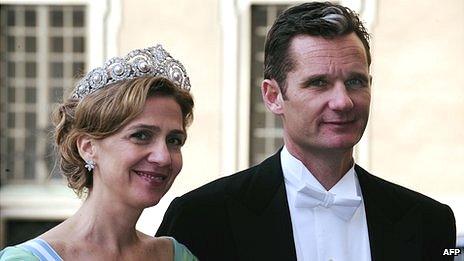Spanish princess to face court in corruption inquiry
- Published

This June 2010 photo shows Princess Cristina and her husband attending a wedding
Spain's Princess Cristina has been summoned to appear in court over allegations that her husband misused millions of euros of public money.
It is reported to be the first court summons for a direct descendant of the Spanish king. She is King Juan Carlos's youngest daughter.
Her husband, Inaki Urdangarin, denies wrongdoing and has not been charged.
He is suspected of having massively overcharged local authorities for organising sporting events.
It is alleged that some of the money ended up in companies controlled by Inaki Urdangarin - who is the Duke of Palma and a former Olympic handball player - in offshore bank accounts.
The events allegedly happened between 2004 and 2006, when the duke stepped down as head of the non-profit Noos Institute.
He and his former business partner Diego Torres are suspected of misusing millions of euros in public funds that were given to the institute - a charitable foundation.
Mr Torres, who was questioned by a judge in February, has also denied any wrongdoing.
The duke has sought to distance King Juan Carlos from the scandal, pointing out in February that the royal house "had no opinion, did not advise and did not authorise" any of his activities at the institute.
"When the accusations arose, the palace recommended I stop any activity not considered appropriate to my institutional status, which I did," the duke is reported to have said.
'Out of touch'
Princess Cristina has been asked to appear in court in Palma de Mallorca, in the Balearic Islands, on 27 April.
Emails have come to light suggesting that the princess knew about her husband's financial affairs, the Spanish El Pais newspaper reported.
Anti-corruption campaigners have urged the judge to formally name Princess Cristina as a suspect, alleging that she may also have been involved.
Emails published by Spanish newspapers in February also appear to show that King Juan Carlos took a close interest in his son-in-law's business affairs.
Support for the royal family has diminished in recent years, amid criticism that it is out of touch with ordinary Spaniards as they struggle with a severe economic crisis.
The king, 75, is credited with steering Spain to democracy after the death of dictator Francisco Franco in 1975 - but his reputation has been damaged by the corruption inquiry implicating his son-in-law and by a luxury elephant-hunting safari he took in Africa last year at a time of record unemployment in his country.
Correspondents say that the summons issued to the princess by Judge Jose Castro will be seen as another extremely damaging blow to the royal family.
The duke was suspended from official royal engagements in December.
His wife - who works as the director of social welfare programmes for a Barcelona-based financial services group - has kept a low profile since reports of the alleged scandal emerged two years ago.
She has mostly confined herself to the mansion in which she lives in the city with her husband and four children.
"The royal household does not comment in any way on judicial decisions," a spokesman for the royal family told the AFP news agency.
- Published23 February 2013
- Published23 February 2013